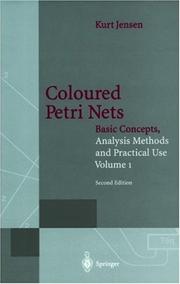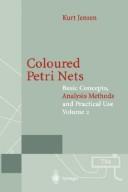| Listing 1 - 10 of 43 | << page >> |
Sort by
|

ISBN: 3540556761 3540472703 Year: 1992 Volume: vol 616 Publisher: Berlin Heidelberg New York Springer-Verlag
Abstract | Keywords | Export | Availability | Bookmark
 Loading...
Loading...Choose an application
- Reference Manager
- EndNote
- RefWorks (Direct export to RefWorks)
This volume contains the proceedings of the 13th International Conference onApplication and Theory of Petri Nets, held in Sheffield, England, in June 1992. The aim of the Petri net conferences is to create a forum for discussing progress in the application and theory of Petri nets. Typically, the conferences have 150-200 participants, one third of these coming from industry and the rest from universities and research institutions. The 1992 conference was organized by the School of Computing and Management Sciences at Sheffield City Polytechnic, England. The volume contains twoinvited papers, by G. Balbo and W. Reisig, 18 submitted papers, and seven project papers. The submitted papers and project presentations were selectedby the programme committee and a panel of referees from a large number of submissions.
Computer architecture. Operating systems --- 681.3 *C2 --- 681.3*D22 --- 681.3*F1 --- 681.3*F32 --- Computer communication networks: data communications; OSI; security and protection --- Tools and techniques: decision tables; flow charts; modules and interfaces; programmer workbench; software libraries; structured programming; top-down programming; user interfaces (Software engineering) --- Computation by abstract devices --- Semantics of programming languages: algebraic approaches to semantics; denotational semantics; operational semantics (Logics and meanings of programs)--See also {681.3*D31} --- 681.3*F32 Semantics of programming languages: algebraic approaches to semantics; denotational semantics; operational semantics (Logics and meanings of programs)--See also {681.3*D31} --- 681.3*F1 Computation by abstract devices --- 681.3*D22 Tools and techniques: decision tables; flow charts; modules and interfaces; programmer workbench; software libraries; structured programming; top-down programming; user interfaces (Software engineering) --- 681.3 *C2 Computer communication networks: data communications; OSI; security and protection --- Petri nets --- Congresses --- Machine theory --- Information theory. --- Computer science. --- Computer software. --- Computer Communication Networks. --- Operating systems (Computers). --- Theory of Computation. --- Computation by Abstract Devices. --- Processor Architectures. --- Algorithm Analysis and Problem Complexity. --- Operating Systems. --- Computer operating systems --- Computers --- Disk operating systems --- Systems software --- Software, Computer --- Computer systems --- Informatics --- Science --- Communication theory --- Communication --- Cybernetics --- Operating systems

ISBN: 3540609431 3540582762 3540628673 9783540609438 9783540582762 Year: 1997 Publisher: Berlin: Springer,
Abstract | Keywords | Export | Availability | Bookmark
 Loading...
Loading...Choose an application
- Reference Manager
- EndNote
- RefWorks (Direct export to RefWorks)
Book
ISBN: 1536103098 9781536103090 9781536102888 Year: 2016 Publisher: New York
Abstract | Keywords | Export | Availability | Bookmark
 Loading...
Loading...Choose an application
- Reference Manager
- EndNote
- RefWorks (Direct export to RefWorks)
Heterogeneous catalysis. --- Catalysts. --- Catalytic agents --- Catalysis --- Chemical inhibitors

ISBN: 3540555978 0387555978 9780387555973 9783540555971 Year: 1997 Publisher: Berlin: Springer,
Abstract | Keywords | Export | Availability | Bookmark
 Loading...
Loading...Choose an application
- Reference Manager
- EndNote
- RefWorks (Direct export to RefWorks)
Book
ISBN: 0387556761 Publisher: Berlin : Springer-Verlag.
Abstract | Keywords | Export | Availability | Bookmark
 Loading...
Loading...Choose an application
- Reference Manager
- EndNote
- RefWorks (Direct export to RefWorks)
Book
ISBN: 9783642002830 3642002838 Year: 2009 Publisher: Berlin: Springer,
Abstract | Keywords | Export | Availability | Bookmark
 Loading...
Loading...Choose an application
- Reference Manager
- EndNote
- RefWorks (Direct export to RefWorks)
Book
ISBN: 3030914402 3030914410 Year: 2022 Publisher: Cham, Switzerland : Springer,
Abstract | Keywords | Export | Availability | Bookmark
 Loading...
Loading...Choose an application
- Reference Manager
- EndNote
- RefWorks (Direct export to RefWorks)
Denmark --- History. --- Politics and government.
Book
ISBN: 9780367558697 0367558696 9780367558703 036755870X 1003095518 1000832333 1003095518 Year: 2023 Publisher: Abingdon, Oxon Routledge
Abstract | Keywords | Export | Availability | Bookmark
 Loading...
Loading...Choose an application
- Reference Manager
- EndNote
- RefWorks (Direct export to RefWorks)
"Scandinavia went through momentous changes throughout the Middle Ages, emerging out of the Viking and Norse age towards 'Christianization'. Alongside this came social, economic and cultural changes which completely transformed the region into the kingdoms which existed in the Early Modern Period. Scandinavia in the Middle Ages covers the entire Middle Ages and integrates all areas of Scandinavia political, religious, cultural and social history into a coherent analysis. Within the broader narrative the historiography of the period and specific topics such as Norse literature, runes and neglected topics such as minorities, like the Sami and Jews, are discussed. Each chapter includes numerous textboxes, which explore central themes, persons and events in greater detail, ensuring students can quickly gauge the key information. The book is divided into three chronological parts 900-1200, 1200-1400 and 1400-1550, which guides the reader through the period in easily digestible sections. This book is essential reading for students of, as well as all those interested in, medieval Scandinavia and Europe more broadly"--
Church history --- Christianity --- Middle Ages --- History --- Scandinavia --- Economic conditions
Digital
ISBN: 9783642002847 Year: 2009 Publisher: Berlin, Heidelberg Springer-Verlag Berlin Heidelberg
Abstract | Keywords | Export | Availability | Bookmark
 Loading...
Loading...Choose an application
- Reference Manager
- EndNote
- RefWorks (Direct export to RefWorks)
Computer science --- Computer architecture. Operating systems --- Artificial intelligence. Robotics. Simulation. Graphics --- Computer. Automation --- vormgeving --- informatica --- computerbesturingssystemen --- simulaties --- software engineering --- KI (kunstmatige intelligentie) --- OS (operating system) --- AI (artificiële intelligentie)
Multi
ISBN: 9783030914417 9783030914400 9783030914424 Year: 2022 Publisher: Cham Springer International Publishing, Imprint: Palgrave Macmillan
Abstract | Keywords | Export | Availability | Bookmark
 Loading...
Loading...Choose an application
- Reference Manager
- EndNote
- RefWorks (Direct export to RefWorks)
This book examines the Danish Empire, which for over four hundred years stretched from Northern Norway to Hamburg and was feared by small German principalities to the South. Evolving over time, it has included most of Scandinavia and the North Atlantic, has shifted from a Western orientation under the Vikings to an Eastern one in the Middle Ages, and from a North Sea Empire to a Baltic Empire. From the seventeenth to the early twentieth century, it comprised small overseas colonies in India, Africa and the Caribbean. Exploring the rise and fall of Denmark's Kingdom, from 9 AD to the present, this textbook considers how such vast empires were kept together through ideology and symbols, military force, transport systems and networks of civil servants. The authors demonstrate how the lands under Danish rule included a variety of religious groups, social and economic structures, law systems, and ethnic and linguistic groups. They also consider the economic and ideological benefit of an empire structure in comparison to a nation state. Providing a detailed overview of the long history of the Danish Empire, whilst also confronting current debate and providing novel interpretations, this book offers an original, imperial and multi-territorial perspective on the history of the Danish state, providing essential reading for students of Danish or Scandinavian history and European or Global empires. Michael Bregnsbo is Associate Professor of Early Modern and Modern History at the University of Southern Denmark at Odense. He is a specialist in the history of Danish state formation and Danish absolutism. Kurt Villads Jensen is Professor of Medieval History at Stockholm University in Sweden. Having previously worked at the University of Southern Denmark, he is a specialist in crusading history and cultural encounters in the Middle Ages. His publications include Crusading at the Edge of Europe (2017).
International relations. Foreign policy --- History --- History of Europe --- imperialisme --- Europese geschiedenis --- middeleeuwen --- kolonialisme --- anno 500-1499 --- Europe
| Listing 1 - 10 of 43 | << page >> |
Sort by
|

 Search
Search Feedback
Feedback About UniCat
About UniCat  Help
Help News
News